By Margy Lutz, Powell River, BC
Christina Nellemann recently wrote an article here on the Tiny House Blog about living on a boat. In it she pointed out some of the challenges and pleasures of life on the water. My husband Wayne and I live on the water, but in a whole different way. You may have read a little bit about it in the October 21 article “Our Little Cabin Up the Lake.” Kent has invited me back to tell you a little more about living in a floating cabin.
What first attracted us to our cabin on Powell Lake in British Columbia was its simplicity. We live there in all seasons. While we’ve made a few changes over the last seven years, we’ve kept the simple life foremost in our minds. Our cabin has 420 square feet downstairs and a 200 square foot sleeping loft under the peak of the roof. Our kitchen is compact but functional. It’s plenty of room for one, but two makes a crowd. On one wall you will find my sink and shelves to store my pots and pans. The window has a great view of the entrance into the Hole in the Wall. With a view like that, you almost don’t mind doing dishes.
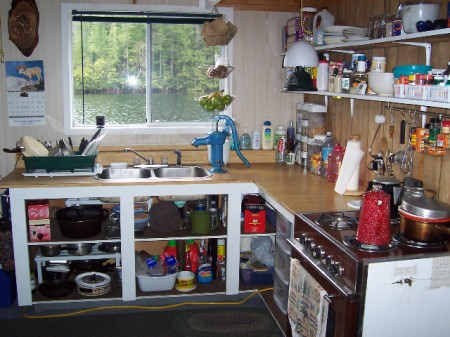
When John built our cabin he installed a hand pump. It draws water from about six feet below the lake surface. To be safe, we boil it before drinking. Continue around the L-shaped counter and there is my small stove and oven. Open wall shelves hold our dishes and food. Under the counter are two plastic drawer units. To deter mice, we keep foodstuffs in containers, especially when we aren’t there. But we’ve been very lucky so far.
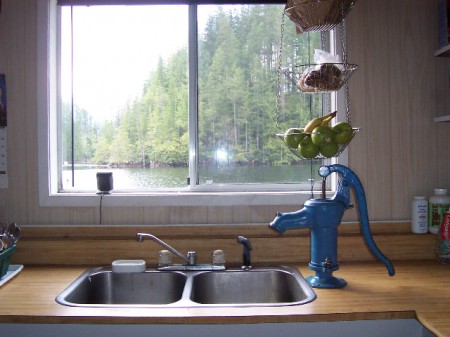
Tucked under the stairs to loft is a small refrigerator. It even has a freezer that really comes in handy during the summer for ice to make ice cream. Both the stove and refrigerator run on propane. Along with propane lights, a 60 lb. tank lasts about six weeks for $54. We have to haul the tanks to town in our boat, but once every six weeks isn’t too bad.
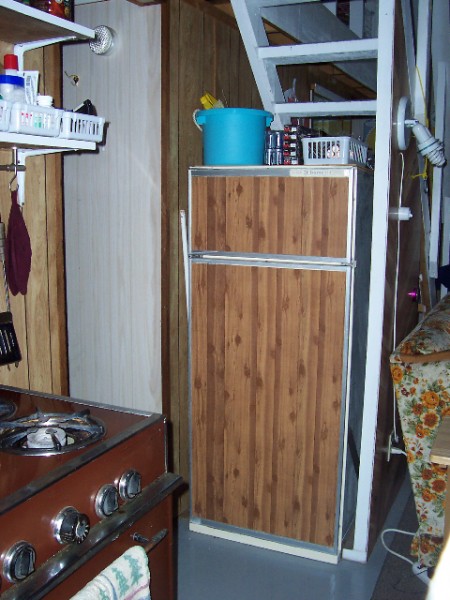
I have to be honest. At the cabin, Wayne is first cook, especially when it comes to the barbecue. But I do have my specialties including cakes, breads and soups. This goes to show you don’t need a big fancy kitchen with lots of electrical appliances to make good food.
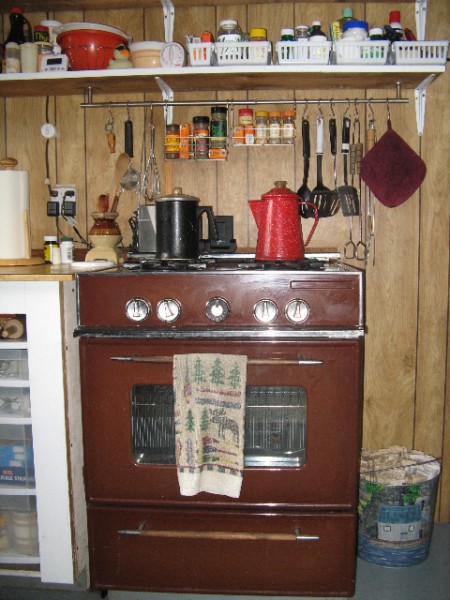
Especially this time of year, our wood-burning stove is the heart of our cabin. With occasional stovepipe cleanings, it keeps the fire roaring hot, or low and slow, depending on our need. I’ve even found a few creative ways to use it to back cakes and bread.
A wood stove must have wood. For us, that’s a fairly simple. Especially during high water, the wood floats right to our front porch. All we have to do is scoop it up, cut it up (sometimes) and let it dry. When we are gathering wood throughout the summer, we are dreaming of the cozy fires it will bring during long winter nights.
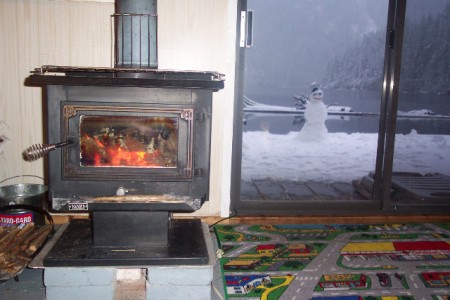
Storing wood on our cabin’s float is problematic. We want it close by, but not weighing down the foundation for our cabin. Our floating woodshed and a small covered woodpile on our transition float to shore serve this purpose well. For those really rainy and windy nights, we have our small indoor wood shelf that holds about 5 days worth of really dry wood. It takes up a little space in our “guest room,” but no one seems to complain.

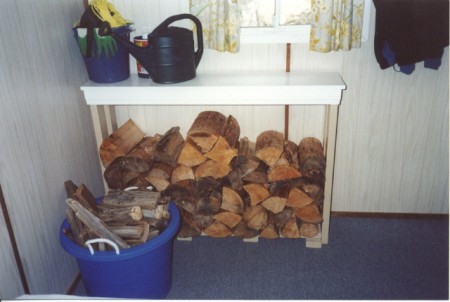
We’ve added electrical power with solar panels and a wind generator, but use it sparingly. We have a few low powered lights in strategic locations and use it to run and recharge a variety of devices, including a satellite radio and laptop computers. We have cellular telephone reception with the help of a car antenna, but purposely have no television or Internet access. The easiest way to make a simple life complicated is with too much TV or web surfing. We get enough of that when we make weekly trips to town. Our cabin life on the water may be simple, but is perfect for us.
You can find more information about float cabin and off the grid living at http://PowellRiverBooks.blogspot.com. For information about Wayne’s Coastal BC Stories, come to www.PowellRiverBooks.com. Up the Lake and Farther Up the Lake have lots of information about our cabin life on Powell Lake.
If you enjoyed this post, subscribe to our feed


….always mesmerized by your cabin! Thanks for sharing more information about it!
Simply off the grid fascinating!
Hello,
What a great blog, have you considered the possibility of learning how to build a wind generator?
Our family has lived off the grid for over 15 years now and have built countless wind generators for ourselves and friends, thought this might be of interest to you.
Want more info on how to build a wind generator?
http://www.homemade-wind-generator.com
All the best,
Les and Jane
This is wonderful. Thanks for sharing this information. I’m a firm believer in wind and solar powered everything. 🙂
Do not bother with the above link. It’s just another ClickBank redirect scam site trying to get you to buy useless information.
Peter
It appears that there are problems with the wind generator link above, but I will go ahead and answer the question because others might be interested. Wayne and I do have a wind generator installed on our float along with a variety of solar panels. Because of the location of our cabin, we don’t get very much wind on a consistent basis. In a way that’s not a bad thing. Wind can really move the cabin around on its tethers. When a storm moves through (mostly in the winter) and there’s a southeast wind, the generator gives us some much needed power. It would be nice to have more wind, especially in the winter when the sun is low and often blocked by clouds. But we take what we can get. — Margy
Thanks for the info Margy! I appreciate details on how people make a simpler life work for them. I also love the snowman. 😉
Looks like quite the life! If there is a running stream around that feeds into the lake you could set up a hydro generator. I have those propane refrigerators if anybody needs one. Half my business comes from Canada as they are twice as expensive there.
http://www.bensdiscountsupply.com/
Hi my name is kimberly im 14 and i also live on the water the only thing i think really wrong were we live is it is so cold.I love your snow man to i wish we could get all that snow!!!
Thanks to Christina, Ben and Kimberly for your comments –
Kimberly, our cabin can get cold, but our wood stove does a great job of warming things up. Fortunately, our climate is pretty moderate. We only get snow a few times each year, and only rarely with enough to make a snowman like the one above. But we love it in any weather.
Yes, Christina, it feels good to simplify our life, but sometimes it feels a bit “complicated” to do so if you know what I mean. Since we were cityfolk it has taken a lot of learning to get things worked out to be somewhat simple.
And for Ben, our propane refrigerator makes life much easier. Ours is a small apartment style, but lets us keep enough fresh food for a week or more. As far as power generation, we are looking into a new wood stove model that seems to have promise. You can see a demo on YouTube http://www.youtube.com/watch?v=SczCj7gilZY or at their website http://www.tegpower.com/products.html.
Margy
me look some information built cabin or boathouse on wather in one information help me out look books or CD ok? here my address and email
p.o. box 534 cave city ky 42127
wolfthunder68@yhaoo.com
spiritwild09@hotmail.com
Hi Margy,
I would like to know if you have to have a liability insurance,meaning: as a request from BC Land & Water. Also, did you have to prove that there is road access to reach your floating home? What about approval for sewer/gray water etc? When you applied for your project, did you have to decide where you would stay, or could you move wherever you want on that lake at any time?
We live in the bush, off the grid, and we are really interested to live on the water too.
Would be nice if you could give us some hints, before we get in contact with the BC-authorities.
thank you kindly
Heidi
Hello Heidi – Here are some answers for your questions. 1) Yes, liability insurance was required, but because we are members of the Powell Lake Cabin Owners Association, they take care of that for us. I would guess you could obtain a policy on your own, but I don’t know what it would cost. 2) We did not have to prove there was road access. Almost every cabin on our lake is water access only. 3) There are gray water rules for BC lakes, but there was no approval process for any type of system as a part of our original lease in 2001. That doesn’t mean there couldn’t be in the future. 4) No sewage can be disposed of in the lake. While you can apply for an outhouse on shore, most cabin owners are trending towards on-float composting toilets. 5) We purchased an existing cabin that was already in a BC approved spot. Our lease is for that spot only. There is a moratorium on additional cabins, so the existing spots are all the only ones for the foreseeable future. You can move a cabin from one existing site to another, but not to a brand new site. Leases are for 20 years and are transferrable.
There are some salt water float cabins along the coast, but most of those are associated with fish farms and logging. I do know there is a cluster of cabins on the west coast below Tofino. Here there are a few float cabins on nearby lakes, but the majority are on Powell Lake. There is a long history so I think BC is sort of “grandfathering” us in. I am not sure if they would accept applications for float cabins on just any lake in the province, maybe just existing locations.
I don’t know if you are Canadian or not. To get a lease you must be a citizen, Canadian Permanent Resident or a Canadian corporation.
Hope that was helpful. If you have more questions you can come over to my blog or send me an e-mail. — Margy
Nice run place in a great location. Well Done.
Thanks David. – Margy
I thoroughly enjoyed reading your article, questions and answers. Bravo ! Do U ever have problems with larger critters such as bears stopping by, attracted by the smell of food? I would invest in a good watch dog because if for not other reason, a dog brings such joy to one’s life.
Christmas Joy to U and yours,
Whitworth Deen
Hi Whitworth – While there are bears in the region, we have never had one explore near the cabin. Our high cliff with no food attraction up on to helps I’m sure. The dog suggestion is good, except I think our 22 year old cat wouldn’t adjust very well. – Margy
Hey Margy, I love this article. The snowman cracked me up, and thinking of you baking on the wood stove reminded me of teenage years living on a mountain near Kelowna, when Mom could bake cakes on top of the pot-bellied stove.
I was thrilled when I saw “Powell Lake” under the heading “Living on the Water” when I got my e-mail from Tiny House Blog today. Just knew it was you two.
I laughed when I saw the previous comment, about you needing a dog. Not sure how Stick would feel about that, but you have access to Bro when you need a dog fix.
I hope you and Wayne and Stick had a lovely Christmas, and that the new year is good to you.
Let’s keep in touch.
K
Hi Kay – Now I know how people heard about it today. I was getting quite a few visitors from here. Wayne, Stick and I had a nice Christmas in Bellingham. Heading home to the cabin tomorrow. Can’t wait. – Margy
What a wonderful cabin! I would be happy living there year-round. Love your blue water pump! 😀
Hi Jean – Isn’t it a classic? It is such a simple thing to use. We never have to worry about our pipes, even in freezing weather with the water below the cabin to moderate the temperatures. – Margy
I am very happy for you that you have been blessed to imagine and work for such a beautiful way to live. Thank you for sharing. I, too hope to manifest my dream in the near future. Though, I plan on living in an authentic Mongolian yurt. I’m looking for the land.